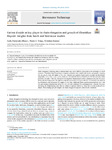Mostrar o rexistro simple do ítem
Carbon dioxide as key player in chain elongation and growth of Clostridium kluyveri: Insights from batch and bioreactor studies
| dc.contributor.author | Kennes, Christian | |
| dc.contributor.author | Fernández Blanco, Carla | |
| dc.contributor.author | Veiga, María Carmen | |
| dc.date.accessioned | 2024-08-07T10:24:12Z | |
| dc.date.available | 2024-08-07T10:24:12Z | |
| dc.date.issued | 2024 | |
| dc.identifier.citation | Fernández-Blanco, C., Veiga, M. C., & Kennes, C. (2024). Carbon dioxide as key player in chain elongation and growth of Clostridium kluyveri: Insights from batch and bioreactor studies. Bioresource Technology, 394. https://doi.org/10.1016/J.BIORTECH.2023.130192 | es_ES |
| dc.identifier.uri | http://hdl.handle.net/2183/38443 | |
| dc.description | Financiado para publicación en acceso aberto: Universidade da Coruña/CISUG | es_ES |
| dc.description.abstract | [Abstract] Chain elongation technology allows medium-chain fatty acids (MCFAs) production as an alternative to fossil resources. Clostridium kluyveri generates n-caproate primarily from ethanol and acetate, presumably requiring CO2 for growth. Here, the impact of CO2 on C. kluyveri was explored. Bottle studies revealed the bacterium's adaptability to low CO2 levels, even in conditions with minimal dissolved NaHCO3 (0.0003 M) and unfavorable pH (below 6) under 1 bar CO2. Bioreactor investigations demonstrated a direct correlation between CO2 availability and bacterial growth. The highest n-caproate production (11.0 g/L) with 90.1 % selectivity was achieved in a bioreactor with continuous CO2 supply at 3 mL/min. Additional bottle experiments pressurized with 1 bar CO2 and varying ethanol:acetate ratios (1:1, 2:1, 4:1) also confirmed CO2 consumption by C. kluyveri. However, increasing the ethanol:acetate ratio did not enhance n-caproate selectivity, likely due to overly acidic pH conditions. These findings provide insights into chain-elongators responses under diverse conditions. | es_ES |
| dc.description.sponsorship | This study was supported by Spanish Ministry of Science and Innovation and European FEDER funds [TED2021-130055B-I00]. CFB thanks Xunta de Galicia for her doctoral contract (ED481A-2020/028). The authors, belonging to the BIOENGIN group, acknowledge the financial support from Xunta de Galicia to Competitive Reference Research Groups [ED431C 2021/55]. Funding for open access charge provided by Universidade da Coruna/CISUG. | es_ES |
| dc.description.sponsorship | Xunta de Galicia; ED481A-2020/02 | es_ES |
| dc.description.sponsorship | Xunta de Galicia; ED431C 2021/55 | es_ES |
| dc.language.iso | eng | es_ES |
| dc.publisher | Elsevier | es_ES |
| dc.relation | info:eu-repo/grantAgreement/AEI/Plan Estatal de Investigación Científica y Técnica y de Innovación 2021-2023/TED2021-130055B-I00/ES/PROCESOS DE DESCARBONIZACION INNOVADORES BASADOS EN LA ELIMINACION DE DIOXIDO DE CARBONO Y SU BIOCONVERSION EN BIOCOMBUSTIBLES Y BIOPRODUCTOS | es_ES |
| dc.relation.uri | https://doi.org/10.1016/j.biortech.2023.130192 | es_ES |
| dc.rights | Creative Commons CC-BY-NC-ND license 4.0 | es_ES |
| dc.rights.uri | http://creativecommons.org/licenses/by-nc-nd/3.0/es/ | * |
| dc.subject | Clostridium kluyveri | es_ES |
| dc.subject | Carbon dioxide | es_ES |
| dc.subject | Ethanol-based chain elongation | es_ES |
| dc.subject | n-Butyrate | es_ES |
| dc.subject | n-Caproate | es_ES |
| dc.title | Carbon dioxide as key player in chain elongation and growth of Clostridium kluyveri: Insights from batch and bioreactor studies | es_ES |
| dc.type | info:eu-repo/semantics/article | es_ES |
| dc.rights.access | info:eu-repo/semantics/openAccess | es_ES |
| UDC.journalTitle | Bioresource Technology | es_ES |
| UDC.volume | 394 | es_ES |
| UDC.startPage | 130192 | es_ES |
| dc.identifier.doi | 10.1016/j.biortech.2023.130192 |
Ficheiros no ítem
Este ítem aparece na(s) seguinte(s) colección(s)
-
GI-BIOENGIN- Artigos [106]






